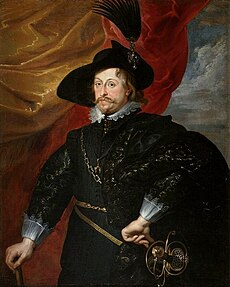Vladislaus IV Vasa
| Władysław IV Vasa | |
|---|---|

Portrait by Rubens
|
|
|
King of Poland Grand Duke of Lithuania |
|
| Reign | 8 November 1632 – 20 May 1648 |
| Coronation | 6 February 1633 |
| Predecessor | Sigismund III Vasa |
| Successor | John II Casimir Vasa |
| Tsar of All Russia | |
| Reign | 19 July 1610 – 21 February 1613 |
| Predecessor | Vasili IV |
| Successor | Michael I |
| Born | 9 June 1595 Łobzów, near Kraków, Poland |
| Died | 20 May 1648 (aged 52) Merkinė, Polish-Lithuanian Commonwealth |
| Burial | Wawel Cathedral, Kraków, Poland |
| Spouse |
Cecilia Renata of Austria Marie Louise Gonzaga |
| Issue more... |
Sigismund Casimir Maria Anna Isabella Władysław Konstanty (Illegitimate) |
| House | Vasa |
| Father | Sigismund III Vasa |
| Mother | Anne of Austria |
| Religion | Roman Catholic |
| Signature | |
Władysław IV Vasa (Polish: Władysław IV Waza; Russian: Владислав IV Ваза, tr. Vladislav IV Vaza; Latin: Vladislaus IV Vasa or Ladislaus IV Vasa; Lithuanian: Vladislovas Vaza; 9 June 1595 – 20 May 1648) was a Polish prince from the Royal House of Vasa. He reigned as King of Poland and Grand Duke of Lithuania from 8 November 1632 to his death in 1648.
Władysław IV was the son of Sigismund III Vasa (Polish: Zygmunt III Waza) and his wife, Anna of Austria (also known as Anna of Habsburg). In 1610 the teen-aged Władysław was elected Tsar of Russia by the Seven Boyars, but did not assume the Russian throne due to his father's opposition and a popular uprising in Russia. Nevertheless, until 1634 he used the title of Grand Duke of Muscovy.
Elected king of Poland in 1632, Władysław was fairly successful in defending the Polish–Lithuanian Commonwealth against invasion, most notably in the Smolensk War of 1632–34, in which he participated personally. He supported religious tolerance and carried out military reforms, such as the founding of the Commonwealth Navy. He was also a renowned patron of the arts and music. He failed, however, to realize his dreams of regaining the Swedish crown, gaining fame by defeating the Ottoman Empire, strengthening royal power, and reforming the Commonwealth.
...
Wikipedia
